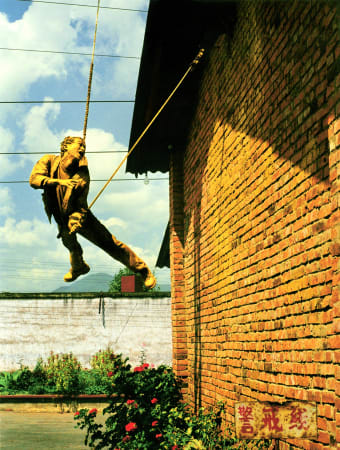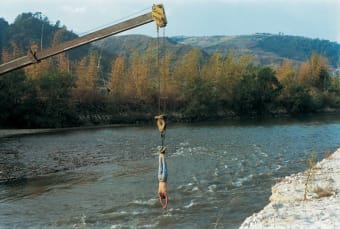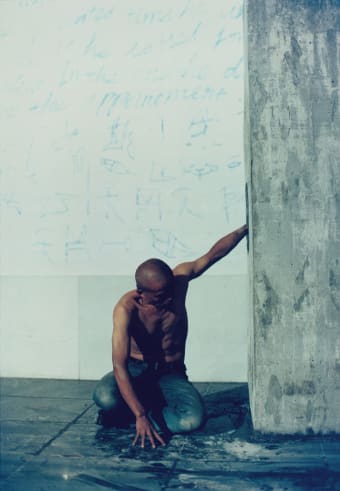|
He Yunchang has been doing performance art for more than 10 years. Before that, he was a painter. His gift in painting is rather exceptional both in technique and in vigor. He lives in Binhe Xiaoqu now, a 20 kilometers straight distance from Tian'anmen Square. In many of his days, he spent most of the time playing chess with few friends, playing video games and eating. Performance art is the only thing in life he feels like he must do it.
He is always inspired for these few moments, or at least he appears to be always thinking and making plans, and that you can tell by paying attention to the enormous amount of cigarettes he smokes. No other Beijing artists would like to challenge him in his field.
The most important performance of He Yunchang's early works is Golden Sunshine (1999). Golden Sunshine is a history about a person. In this action he has his body totally painted in yellow and lifted in the middle of the air. With great difficulty, he holds a mirror with which he manages to divert some sunshine onto the shadow of the overbearing prison wall. Because of this reason once he went back to Yunnan many people start calling him Ar Chang, thanks to the heroic form this performance took and the irony it contained now he firmly established in the art circle. The primary principle of this initial work unfailingly comes back in different ways in all of his later works.
A Dialogue with Water (1999) was done even earlier. Ar Chang was hoisted upside down above a river and he kept stabbing a knife into the water for 30 minutes. At the speed of 150 meters per minute, 4500 meters of the river was "cut" while each of Ar Chang's arms had a 1-cm cut. The blood flowed along his arms merged with the "wound" of the river.
Ar Chang, knife, river and blood made up the condition for the dialogue with water. There was no audience, no lighting, no music. But the work itself provides sufficient experience and speaks unbelievable facts, which penetrate into our spiritual reality like a sharp weapon. This omnipresent idealistic reality is our history, current condition and future one that hasn't happened yet.
Focusing on individual emotions, willpower and tenacity he brings all to fulfillment. Ar Chang consistently deals with the issues of what "individualism" is, what personal "willpower" and "ideal" are, and the violent conflict between wishes, willpower, and reality in all of his works, even though sometimes conflicts give us a false sense of beauty. In Ar Chang's performances, personal willpower is persistently carried through and is accomplished in a simple but hard way. Under most circumstances, we only get to see the finished attempts. In those pictures of live performances we can see that he has arrived to prove his total willpower, for him so sacred to seem nearly absurd…as we say in Chinese: "he moves one to song and tears".
"Persistence" is the inevitable disguise for his work with which Ar Chang enters a one-personal war. In this battle, the "enemy" is everything beyond himself. The confrontation between the feeble individual and the powerful other makes the war appear unrighteous but yet glorious. As long as he's still doing it and still breathing he will constantly talk about what willpower is and why willpower is invincible. In his endeavors Ar Chang's behaviors have a nearly religious meaning - to fight for a belief or to denounce a belief and pay for it. This is the reason why Ar Chang's efforts go way beyond what we usually call performance art.
Ar Chang's works are difficult to perform. In most cases he's not happy with the result. He likes playing chess, his style is one of those that play randomly and unmannerly. Many times I saw him reviving a situation that would have definitely failed. Cantonese like to describe those situations saying :"Turning over the salty fish". Once his competitor became even furious, having to let go something that was already supposed to be in his pocket, but Ar Chang was so happy that he couldn't close his black-teeth filled big mouth for a whole week.
(Written in 2004)
|




